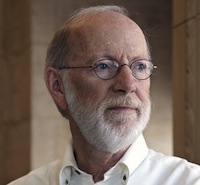
In a time of an unrelenting onslaught of devastating news from the COVID-19 pandemic, it’s hard to imagine that we will get to the other side of this mounting humanitarian and economic catastrophe. And it’s even harder to imagine that there could be good news that will emerge from it. But there are a few slivers of silver lining that one can point to…
- The world might get used to cleaner air. As air traffic has plummeted and the world is driving less, blue skies have emerged where they haven’t been seen in years. Particulate pollution levels are down dramatically in China. The air is cleaner in cities worldwide. Perhaps this change will be noticed and—once the pandemic ends—we will collectively advocate for keeping the skies blue by converting to electric vehicles, building bike paths to facilitate bicycle commuting, and other measures.
- Carbon emissions will be way down this year. I haven’t seen data reflecting this, but I’m guessing that the drop in carbon dioxide emissions in 2020 will be dramatic. It may even be great enough that the instruments measuring CO2 levels on Mauna Loa in Hawaii (the Keeling Curve) will show it. If that happens, it will provide clear evidence that reducing the combustion of fossil fuels has clear, measurable effect on global CO2 concentrations, and it may inspire action.

- China, and other countries, may finally terminate the horrible practice of taking rare animals from the wild and selling them live in markets. Endangered mammals like pangolins, which some experts suggest may be a source of the COVID-19 virus, are being driven toward extinction to serve the demand for exotic wild animal meat in China. China has announced that is banning the sale of wild animals for food—though the same restrictions have not been announced for the Chinese medicinal trade.
- All of us may learn to appreciate the importance of science. Science has been under attack in the United States, led by our president, Republicans in Congress, and their media mouthpiece: Fox News. The advance of COVID-19, on the track laid out by the scientific community and long dismissed by this cadre of anti-scientist politicians and pundits, may be convincing the public that we need to rely on scientists and robust science. If that can happen with the pandemic, perhaps it can happen with other global crises, like climate change.
- With measures to extend medical leave, provide free COVID-19 testing (where you can find it), and broaden access to medical support, we are inching toward the sort of socialized medicine that Bernie Sanders and others have long called for in the U.S.—and that exists in virtually all industrialized countries The pandemic may broaden the support for that.
- We’re learning that telecommuting—working from home—can really work to an extent not realized before. Videoconferencing platforms like Zoom and GoToMeeting are helping facilitate this. My guess is that many companies will recognize the economic benefits of maintaining a more liberal policy on working remotely post-COVID-19, and society will benefit from less traffic congestion and less pollution from vehicle use.

- Even as COVID-19 calls for social distancing, it is bringing people together in wonderful ways. College students sent home have banded together to form Invisible Hands, a distributed support network delivering food and other supplies to those in greatest need. Locally, a spontaneous group has gotten together in our area to sew facemasks for health care providers unable to source that much-needed commodity. And just last night our local neighborhood held the first of what will become a regular, weekly, hour-long Zoom check-in that will help us get to know our neighbors better.
- COVID-19 is demonstrating the need for people and nations to work together in bringing the pandemic under control. If such efforts are successful, it can demonstrate the power of cooperation that we will so desperately need for other global crises, such as the humanitarian efforts that will be required with climate-related refugee resettlement.

- It’s too early to say for sure, but the pandemic response may generate bipartisanship in Washington. We aren’t really seeing it yet, but I’m holding out hope.
- COVID-19 may bring about a shift in economic philosophies—convincing legislators that we need to “save for a rainy day”—paying down the national debt and ending the model of deficit spending even when the economy is strong. There are times when we need to run up the national debt—times of crisis, like we’re facing today—but it would be a lot easier to do that if we had money in the bank. Cutting taxes and amassing debt when the economy is strong is bad economic practice.
- COVID-19 and the empty food shelves many of us have seen in our grocery stores may help us value local, distributed food production. The just-in-time economy works really well for the profitability of businesses, but it’s not a resilient practice. Locally, small farms and CSAs are expanding their production. Seed suppliers are seeing a big uptick in sales to home gardeners.

- Planning for the unforeseen may become part of our modus operandi—and this will have numerous other benefits. Resilient design is needed to protect against rising sea level along our coasts, to lessen the damage from wildfires in the West, to strengthen our our energy infrastructure, and in so many other aspects of our society.
With resilience, we often think about bouncing back from a disturbance. But I prefer to think about bouncing forward. Let’s look for opportunities to bounce forward from the COVID-19 pandemic. We have a long way to go before recovery can begin, but let’s think about how we want the future to change in response to the pandemic. How can we end up with something better?
I’ve shared a few thoughts here. What else comes to mind?
# # # # #
Along with founding the Resilient Design Institute in 2012, Alex is founder of BuildingGreen, Inc. To keep up with his latest articles and musings, you can sign up for his Twitter feed. To receive e-mail notices of new blogs, sign up at the top of the page.





















Really well done, Alex, thank you. Echoing some of your points, I expect/hope that a result of the pandemic will be a strengthening of grassroots efforts at just about everything. In my own work with climate and buildings, I see provinces, cities and counties — the subnational governments — stepping up to do what needs doing. Except for maybe Iceland and New Zealand, no national government has done much to halt & reverse climate disruption, and I doubt that even a Biden or Sanders victory will turn things much by itself. Though it would surely help . . .
That’s an interesting point, Bruce. Certain aspects of a pandemic call out for national and international response, since a virus knows no political boundaries. This is one of the reasons why President Trump’s response has been so disappointing. That said, grassroots-level responses to both pandemics and climate change make total sense—as your climate-change-related work in California has so clearly shown.
All really good points Alex, thanks for summing all that up. I really to believe this challenge can yield some good for the long term, if we pay attention.
Thank you, Alex. Really appreciate your astute compilation of these meaningful shifts taking place before our eyes, a great service and a ray of sunshine. Some I’d add are that people are becoming appreciative of the value of slowing down, pausing and making time for inner connection through Mindfulness, prayer and self reflection. We are also turning to nature for solace, and celebrating good old fashion play and quality time with family.
Great points, Barbi!
In my neighborhood, I see families taking walks together – which I’ve only seen happen since schools were closed. It’s a lovely sight!
I love the idea of bouncing forward, since our politicians are so focused on bouncing back. I agree that we can’t and won’t go back to where we were. It is vital that we leave the coronovirus era heading in a different direction than the one we entered from.
The obvious example is Zoom meetings. Everyone is now rapidly climbing the learning curve, and online meetings have gone from ancillary to central. It is now obvious to all who have participated in these meetings that the huge amount of commuting time to get to the meetings is an avoidable cost. Now that everyone has had this boot camp training, it will be obvious to corporations and workers that their time is better spent meeting on line. The bounce back will be far smaller, to the benefit of the environment and the companies and workers.
A less helpful trend will be the rise of intrusive surveillance, such as tracking the vectors of the virus as they are doing in Israel. Something people will be willing to accept for medical reasons, that will become entrenched if we are sanguine.
Our culture is now a massive state of flux, as the pieces have been thrown in the air like puzzle pieces that may form new patterns, but won’t ever fit together in the old way. Now is the only time to influence the direction we take, the direction of the world to come.